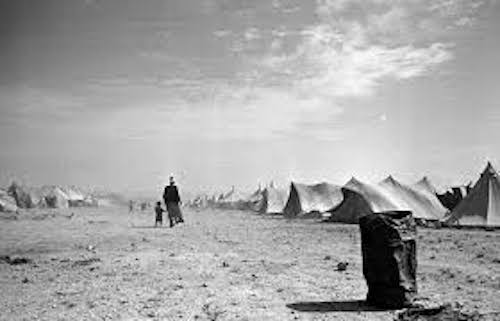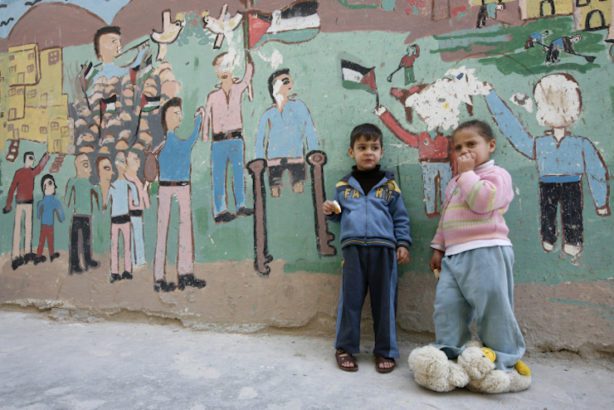By Sami Abou Shahadeh: Since 1948, the Israeli establishment has been doing everything possible in order to negate the Nakba. But claim after claim, their mythology has been debunked, even by some Israeli historians.
Seventy-five years later we know that there were well-documented plans of ethnic cleansing, a political decision to expel as many Palestinians as possible, as well as swift legislation to make it impossible for them to return.

Blaming the victim, a basic tactic of the hasbara tool box, did not manage to make the Palestinian people, including 1.7 million citizens of Israel, forget about what has happened in 1948 and ever since. As most Zionists still deny the Nakba, and others including ministers in the current government even call for a second one, international recognition represents not just a step for historical justice but a form of protection for the Palestinian people.
The fact that this year the United Nations will mark the Nakba for the first time is an important step forward. But we still face a chorus of complicit international voices that do nothing but adding salt to our wounds.
Both the Netanyahu government and the Lapid/Gantz formula have advanced policies that perpetuate the legacy of the Nakba, from settlement expansion and home demolitions to the division of Palestinian families through the banning of family reunifications. In Israel there is no mainstream Zionist party that does not feel proud of what we Palestinians know as the Nakba.
One by one, western countries have lost the chance to remind Israel that there will be no celebrations of “independence” until the Nakba is addressed and Palestinians can also celebrate the long overdue exercise of their inalienable right to self-determination.
The international community has enough tools to deliver its message. On May 11, 1949, the UN adopted Resolution 273 granting Israel membership in the organization only after “noting furthermore the declaration by the State of Israel that it ‘unreservedly accepts its obligations of the United Nations Charter and undertakes to honor them from the day when it comes a Member of the United Nations.” The resolution also added the Israeli commitment to implement Resolutions 181 (two states) and 194 (return of Palestinian refugees).
But Israel has not failed just to implement those resolutions but every single resolution related to its obligations in Palestine. Seventy-five years later, instead of calls for accountability, we see western powers calling for “deepening relations” with a country with whom they allegedly “share values.” The systematic denial of the inalienable rights of the Palestinian people is clearly not a priority for them.
One of the important elements of UN Resolution 194 was the creation of the Palestine Conciliation Commission. Few even know about this committee, whose members are comprised of the United States, France and Turkey. But 14 million Palestinians worldwide should know this key fact: The Commission created a database of Palestinian refugee property detailing the dispossession from which the Palestinian people has suffered.
The database includes at least 6,000 maps, 540,000 parcels of land and 210,000 owners for at least 5.5 million dunams (1.359 million acres) of private Palestinian property, excluding the Naqab (Negev). There are copies of this database in several countries, including the U.S., Palestine and Israel.
But according to Israeli law, I cannot reclaim those of my family’s properties that appear in this database. Simply because I am a Palestinian citizen. Only Jews can reclaim pre-1948 property. This is what we Palestinians refer to as the ‘ongoing Nakba.’
At the core of negating the Nakba, or ignoring it, is the denial of any sort of accountability, which remains the core reason why the issue of Palestine and the Israeli-Palestinian conflict remain unresolved. Ignoring the Nakba doesn’t just mean whitewashing the ethnic cleansing of at least 500 villages, towns and cities, but also the imposition of a system of Jewish supremacy all over historic Palestine that perpetuates the absence of any just and lasting solution to the conflict.
A simple look at the dozens of racist laws approved by the Israeli parliament over the past 75 years includes not just tools to steal Palestinian private property and prevent Palestinians’ right of return, but even a law banning the commemoration of the Nakba.
This Israeli government is particularly proud of the legacy of the Nakba. It aspires to implement it more fully, from the Old City of Jerusalem to Sheikh Jarrah, from Masafer Yatta to Khan al-Ahmar. The Zionist political mainstream will continue to consider as normal the fact that Palestinians in exile are not allowed to even visit the West Bank, while Jews worldwide can become settlers in occupied Palestinian territory.
But such realities should not be normalized. Recognizing the Nakba remains a basic requirement for justice. Seventy-five years after, we Palestinians have not forgotten. It is high time that Israelis stop their efforts to hide reality. And the international community, belatedly, should face the facts and assume their responsibility too.
Sami Abu Shehadeh is the leader of Balad party and served as a member of the Knesset for the Joint List from 2019 to 2022.

No comments:
Post a Comment